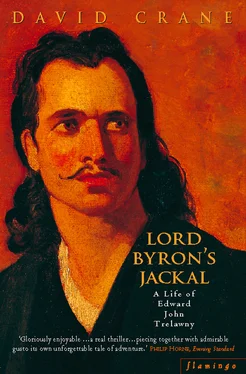1 ...6 7 8 10 11 12 ...25 After the public humiliations of the King’s Bench and Consistory Courts, Trelawny was ready to face the world, a Byronic hero with a history and personality to match. In the depths of his imagination he had forged an identity which seemed more vividly true to his sense of self than the reality he had left behind, and if the same might be said of every creative liar, what distinguishes him from a Savage or Baron Corvo is that for the next five years life was to give him what he wanted with an almost Faustian prodigality – years in which invention became a self-fulfilling ordinance, and events danced to the tune of the imagination until fantasy and life pursued each other in an unbreakable circle.
If psychologically he was prepared for a new life, financially, too, he was at last able to expand his horizons. Through all the rows with his father he had continued to draw an allowance of three hundred pounds a year, and while that was scarcely enough to support a family in comfort, for a single man ready to live abroad it opened up possibilities of leisured and gentlemanly self-indulgence. On 19 May 1819, the Royal Assent to his divorce was given, freeing him of those domestic ties which had shackled his turbulent spirit. The seven lean years were over. Caroline, at last, was out of his life, taking their younger daughter, Eliza, with her. The elder child, Julia, had been farmed out to friends of the Whites. He seems to have backtracked too from the brief intensity of his friendship with Augusta, allowing it to mellow into a mutual warmth which lasted throughout their lives.
The disappointment and failures of the navy and marriage, the first-floor parlours and bedrooms, were not just forgotten but buried. Mentally he had toughened and changed, developing out of all recognition from the dull lout his uncle had found him ten years earlier. At the age of twenty-eight he had also physically grown into the role he had created for himself, tall, dark, athletic, immensely strong and handsome. All he needed now was a stage on which to play out his new part. His father had offered to buy him a commission in the army, but for a follower of De Ruyter that was hardly an option. He had talked vaguely for a time of South America as well, of joining either General Wilson or a commune. In the end, however, he settled for the Continent. One of his last addresses in England before leaving was 7 Orange St, the site now of the archives of the National Portrait Gallery. It was a prescient choice of address for a man about to launch himself into the forefront of the nation’s consciousness.
2 THE SUN AND THE GLOW-WORM
‘You won’t like him.’
Byron to Teresa Guiccioli 1
IT MUST HAVE BEEN sometime in the autumn of 1819 or the beginning of 1820 that Trelawny finally left England for the Continent, travelling first to Paris where his mother was chaperoning his sisters on a predatory hunt for husbands, and from there to Geneva.
With the poverty of letters from this time it is impossible to be dogmatic about Trelawny’s motives but there would have been compelling reasons other than disappointment and money for his decision to live abroad. There appears to have been nothing particular in his choice of Switzerland, but for a man of his burgeoning radicalism the England of Castlereagh and the Peterloo Massacre can have seemed no place to be, a country frozen in the mini ice-age of reaction which gripped post-Napoleonic Europe, a land, in Shelley’s savage assault, of,
An old, mad, blind, despised, and dying king, –
Princes, the dregs of their dull race, who flow
Through public scorn, – mud from a muddy spring, –
Rulers who neither see, nor feel, nor know,
But leech-like to their feinting country cling,
Till they drop, blind in blood, without a blow, – 2
At a time when so many European liberals were seeking refuge in England, there seems something stubbornly wrongheaded in the reverse process, but for Trelawny at least the freedom the Continent offered had more to do with the texture of life than any considered set of principles. Like so many men of his nation and class nineteenth-century Europe represented above all else a continuation of the eighteenth century ‘by other means’, an opportunity – heterosexual, homosexual, financial, social or whatever – to pursue a style of life which inflation and the looming threat of ‘Victorian’ morality was endangering at home.
It was an opportunity he embraced with relief and gusto, but amidst the shooting, hunting and fishing that signalled a reabsorption into his own class, a meeting occurred that was to change the direction of his life for good. A family friend of the Trelawnys from the West Country, Sir John Aubyn, kept a generous if irregular open house at his villa just outside Geneva, and it was in this motley expatriate world that Trelawny first met Edward Williams, an Indian army officer living in Switzerland as a married man with the wife of a fellow officer, and Thomas Medwin, the cousin of Percy Bysshe Shelley.
The friendship of Williams, at least, was one that Trelawny treasured all his life, but more important, it was through these two men that he now found himself drawn into the Italian orbit of Byron and Shelley. There is no way of being sure when he first came across the name or work of a poet who, in 1820, was known mainly for his atheism, but Trelawny’s account invests the occasion with a significance that is poetically if not literally true. The scene is set in Lausanne in 1820, during a conversation with a bookseller-friend, who would translate passages of Schiller, Kant or Goethe for an ex-midshipman still painfully conscious of his lack of education. The story forms the opening scene of his Records of Shelley, Byron, and the Author and among the apocrypha of his early life it holds a special place.
One morning I saw my friend sitting under the acacias on the terrace in front of the house in which Gibbon had lived, and where he wrote the Decline and Fall . He said, ‘I am trying to sharpen my wits in this pungent air which gave such a keen edge to the great historian, so that I may fathom this book. Your modern poets, Byron, Scott, and Moore, I can read and understand as I walk along, but I have got hold of a book by one that makes me stop to take breath and think.’ It was Shelley’s ‘Queen Mab’. As I had never heard that name or title, I asked how he got the volume. ‘With a lot of new books in English, which I took in exchange for old French ones. Not knowing the names of the authors, I might not have looked into them, had not a pampered, prying priest smelt this one in my lumber-room, and after a brief glance at the notes, exploded in wrath, shouting out, ‘Infidel, jacobin, leveller: nothing can stop this spread of blasphemy but the stake and the faggot; the world is retrograding into accursed heathenism and universal anarchy!’ When the priest had departed, I took up the small book he had thrown down, saying, ‘Surely there must be something here worth tasting.’ You know the proverb, ‘No person throws a stone at a tree that does not bear fruit.’
‘Priests do not’, I answered; ‘so I, too, must have a bite of the forbidden fruit.’ 3 *
Set alongside the impact of Byron on Trelawny, the influence of Shelley’s poetry seems virtually negligible, but this, in stylized form, is still one of the key moments of his life. A few days after this exchange he was breakfasting at a hotel in Lausanne, when a chance conversation with an Englishman on a walking holiday with two women gave him his first opportunity to test this new enthusiasm. It was only after their party had broken up that Trelawny learned that the ‘self-confident and dogmatic’ stranger was Wordsworth, but chasing him down again he ‘asked him abruptly what he thought of Shelley as a poet.
Читать дальше












